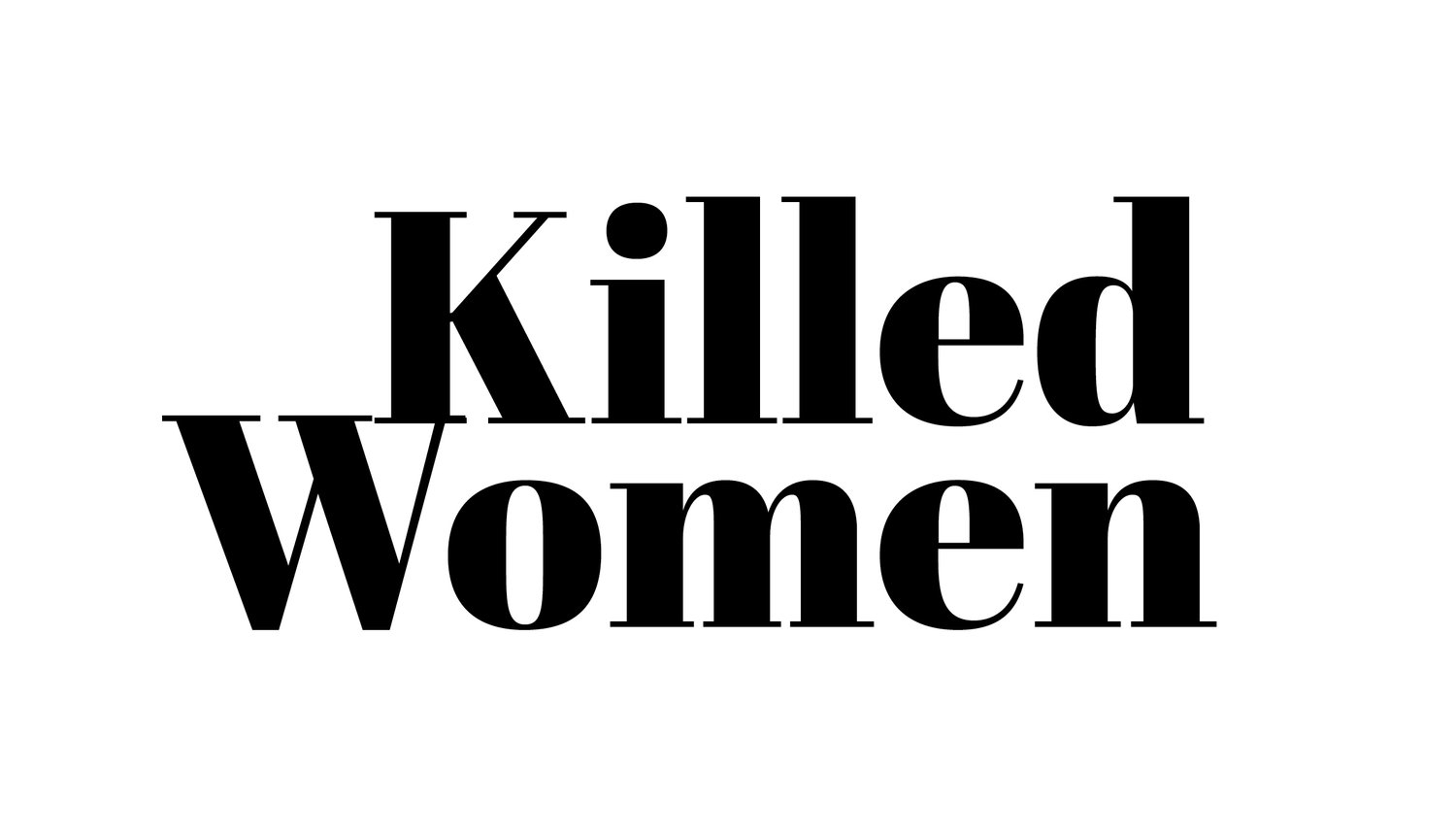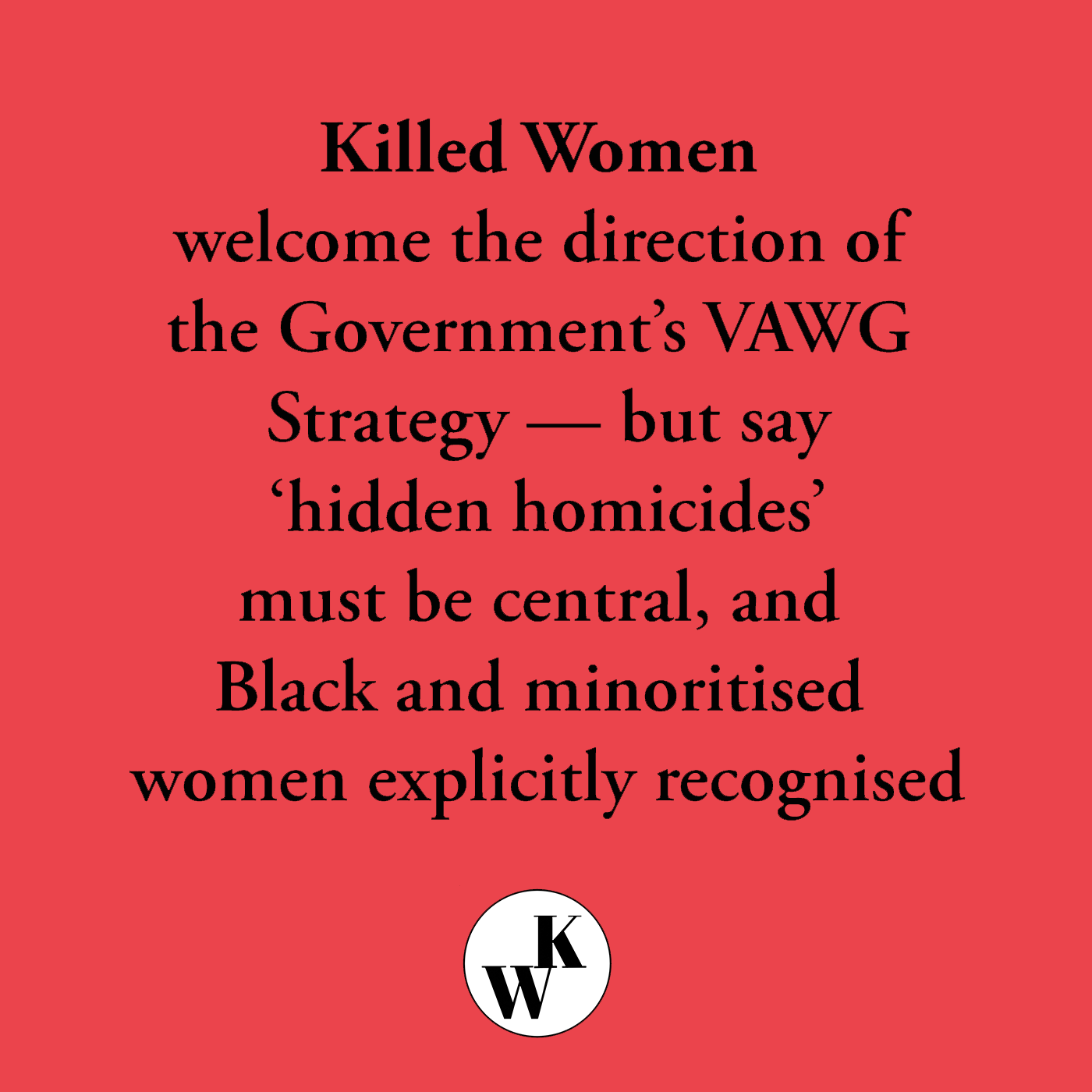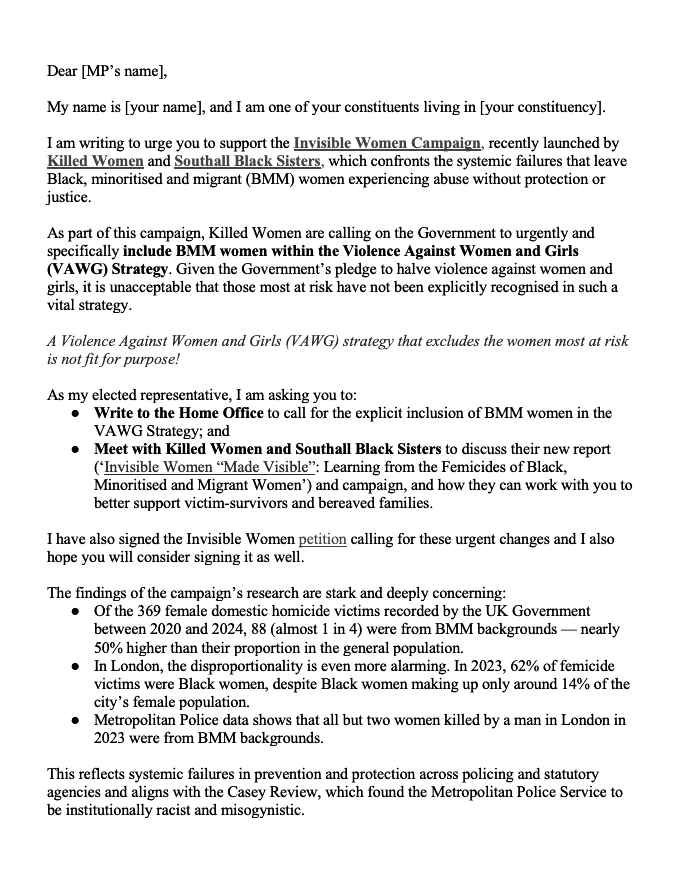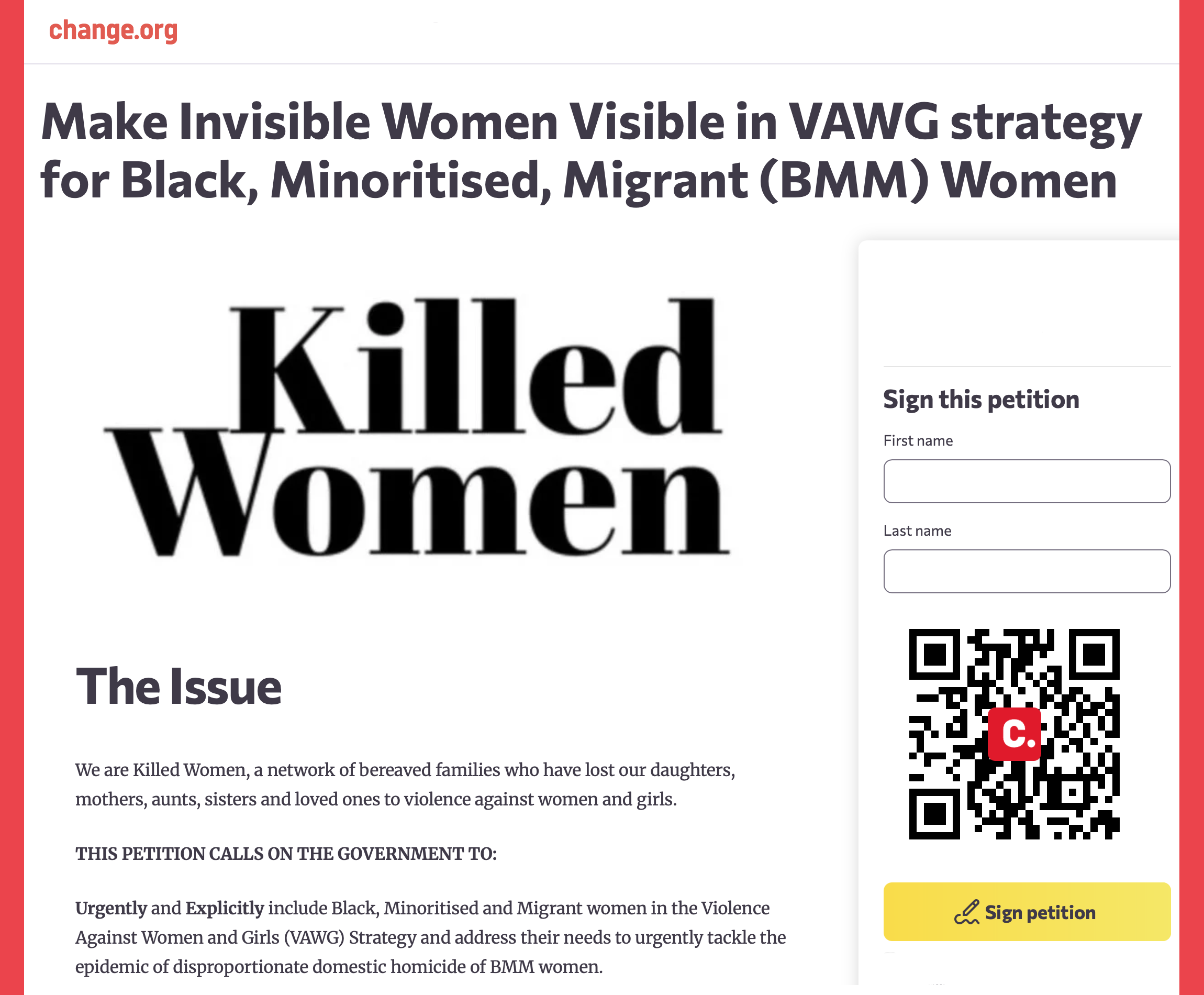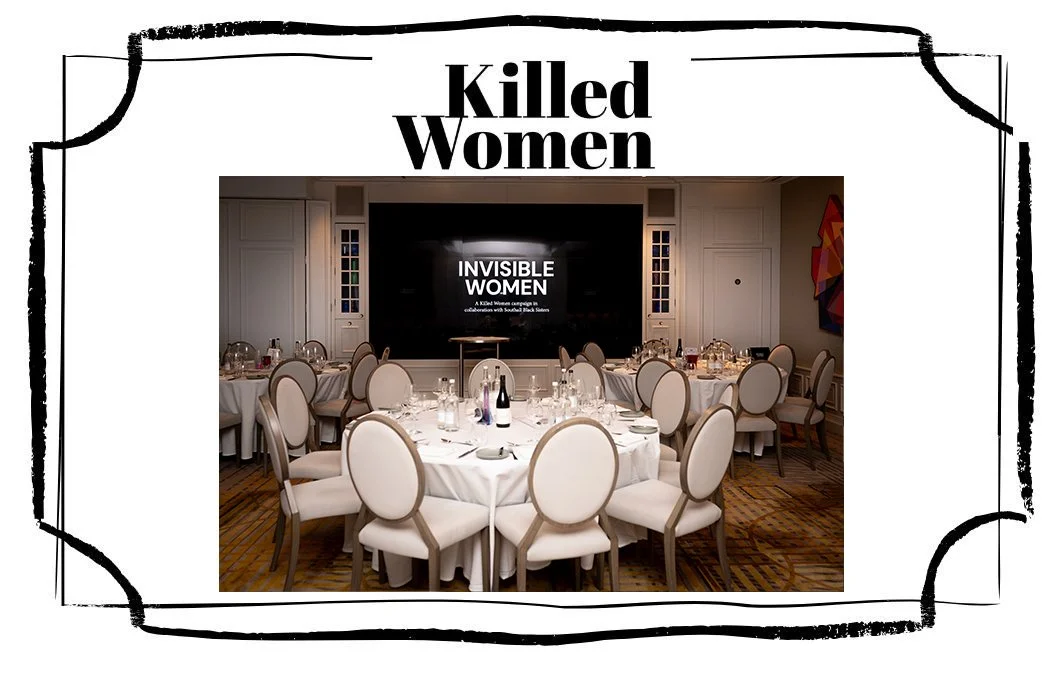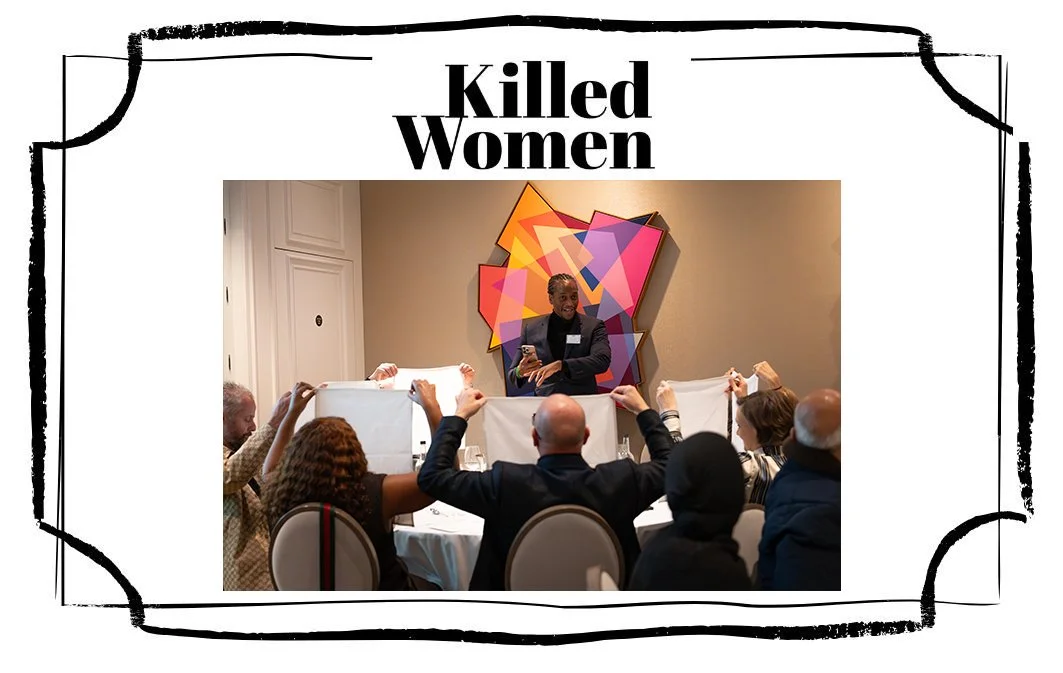Invisible Women
We are Killed Women, a network of families who have lost our daughters, mothers, sisters and loved ones to male violence. We believe it is unacceptable that Black, minoritised and migrant (BMM) women are still not explicitly mentioned and recognised as victims in the Government’s long-overdue Violence Against Women and Girls (VAWG) Strategy.
We have launched a petition on Change.org that calls on the Government to explicitly include BMM women in their VAWG Strategy.
Our report ‘Invisible Women “Made Visible”: Learning from the Femicides of Black, Minoritised and Migrant Women’, in partnership with Southall Black Sisters, shows the deadly consequences of this exclusion:
🖤 1 in 4 women killed by domestic homicide were Black, minoritised or migrant.
🖤 In London, 62% of femicide victims were Black women.
🖤 Almost every woman killed by a man in London in 2023 was from a BMM background.
These women were failed by systems meant to protect them — A VAWG strategy that ignores the women most at risk is not fit for purpose — Our loved ones should still be here.
_________________________
How you can help:
● Sign our Petition ‘Make Invisible Women Visible in VAWG Strategy for BMM Women’.
● Write to your MP, urging them to support our Invisible Women campaign, which confronts the systemic failures that leave BMM women experiencing abuse without protection or justice. Here is a template letter to send to them.
● Sign the petition here.
watch the FILM: Invisible Women: We Were Here, Where Were You?
On 31 October 2025, Killed Women launched a campaign to confront systemic failures that leave Black, minoritised and migrant (BMM) abuse victims and families unprotected and without justice. The campaign — INVISIBLE WOMEN — demands accountability, visibility and systemic reform across policing, Domestic Abuse-Related Death Reviews (formerly Domestic Homicide Reviews), inquests and support services.
INVISIBLE WOMEN is a family-led campaign founded by Killed Women Co-Founder Jhiselle Feanny with support from Dr. Hannana Siddiqui of Southall Black Sisters. The campaign brings together the bereaved families of BMM women killed through domestic abuse and fatal male violence, both in public spaces and in the home. This includes bereaved families who believe that substandard police investigations have meant their loved ones have never had justice, with their cases not leading to a conviction.
The campaign launched with the release of:
● The FILM Invisible Women: We Were Here, Where Were You? (created by Levi James)
● The PLEDGE Invisible Women: We Were Here, Where Were You?
● The REPORT Invisible Women “Made Visible”: Learning from the Femicides of Black, Minoritised and Migrant Women
make your PLEDGE: Invisible Women: We Were Here, Where Were You?
CAMPAIGN PLEDGE
INVISIBLE WOMEN: WE WERE HERE, WHERE WERE YOU?
We want justice and a government commitment to culturally competent, anti-racist practice and to amplifying bereaved families’ calls for change. By making your pledge you affirm your commitment to help us:
● See and honour our women: Amplify bereaved families’ voices, and share the film, the report and the campaign in general, with the hashtags #InvisibleWomen #WeWereHere #WhereWereYou
● Change practice: Commit to anti-racist, culturally competent responses across policy, policing and support, and remove barriers such as NRPF; while challenging institutional racism, bias and neglect.
● Support: Back specialist ‘by and for’ services.
You can also show your support by donating to Killed Women: https://www.killedwomen.org/donate
read the REPORT: Invisible Women “Made Visible”
INVISIBLE WOMEN is calling for:
● Independent oversight and clear standards for death and serious-harm police investigations involving BMM women;
● Mandatory cultural competence training and accountability across the justice system — including policing and courts;
● Guaranteed access to specialist ‘by and for’ services and safe accommodation regardless of immigration status;
● An end to No Recourse to Public Funds (NRPF) and removal of immigration-related barriers to safety;
● Disaggregated data based on ethnicity and public reporting of obligations by agencies such as the police.
Melanie Brown MBE, campaigner:
“This important campaign challenges racism and discrimination in policing and policy. We know it happens and it is up to us all to take action and call for much-needed changes. Last week I met some of the families who have lost their loved ones. Their stories devastated me but their courage to fight in the face of their grief just blew me away. It is so important that everybody joins us in this campaign and does everything they can to support them.”
Jhiselle Feanny, Co-Founder & Head of Outreach and Operations, Killed Women, and Co-Chair of Invisible Women:
“The bereaved families’ loved ones featured in this campaign should never have been invisible. Seven families are standing together to say: enough. We’re asking the public and institutions to stand with the families of this campaign — to say their loved ones were never invisible and to demand state accountability and action so that no more lives are lost.”
Dr. Hannana Siddiqui OBE, Director of Policy, Campaigns & Research, Southall Black Sisters, and Co-Chair of Invisible Women:
“Racism, misogyny, and community and state failures cost lives. Invisible Women demands urgent action to change cultural and religious norms which justify murder in the name of ‘honour’, and legal and policy reforms to end discrimination against BMM women to prevent femicide. Migrant women must have both status and support to escape abuse, and BMM women need specialist ‘by and for’ services and culturally appropriate responses so that such tragedies never happen again.”
Bekhal Mahmod, sister of Banaz Mahmod and victim-survivor:
“Although it brings so much sadness to my heart and makes me tremble with anger, this campaign will show the many failures of this country’s government and authorities that could have helped to keep these women safe instead of failing them due to their lack of knowledge and unwillingness to change laws for them and others who are likely to be in this position at some point in their lives.”
Family quotes
Failure to act on perpetrators’ known histories; victim-blaming and dismissal of abuse reports
“It’s never the man’s fault. Women are always placed at the heart of the blame: What did you do to initiate this divorce? Why did you run away? Why couldn’t you make it work? And I think that goes across all societies, all backgrounds, all races. So whether it’s rape culture, or whether it’s sexual harassment, [the questions are always]: What were you wearing? What were you doing? Why did you go out there late at night? Do you really need to [go out for a] run on your own? All of those things, that kind of blame culture.” — Bereaved family member
“She was let down by lots of people. The police let her down. She’d gone to them so many times about the stalking, and they hadn’t taken it seriously. [She had an] injunction, [which] I don’t think was really taken seriously either. Sitting in the court, hearing evidence, [I felt] like, why didn’t you do more? Why didn’t you put something in place for her? Why didn’t you try and keep her safe?” — Bereaved family member
“The barriers are being heard, seen, understood. Because they will listen to you, and think, ‘oh, that’s so far-fetched’. And ‘that could never happen in the UK’. And they see you, and they think, ‘yeah, she just had a bit of a tumble with her partner’. They don’t look deeper into it. And they just don’t take you seriously at all.” — Bereaved family member
Lack of adequate training and coordinated safeguarding
“They had no training, the system was failing, they had no idea what they were dealing with.” — Bereaved family member
Failure to collect evidence and investigate properly
“We felt really disappointed with their behaviour and lack of enthusiasm to investigate the case properly. It got to a point where we were just contacting them all the time and trying to get information. They didn’t want to follow up the case properly or follow the leads. There was so much evidence they could have had.” — Bereaved family member
In the week before the launch of Invisible Women: We Were Here, Where Were You?, Invisible Women hosted a private dinner with a number of high-profile guests who support the campaign, including campaigner Melanie Brown MBE and presenter and athlete Jeanette Kwakye. For a fuller selection of photographs (by Carolina Rapezzi) from the evening, please click here.
Some of the pledges we have received so far:
- “I pledge to listen, learn and act.” (Alex Davies-Jones MP, Minister for Victims)
- “I pledge to continue to do my utmost to work with Invisible Women and KWN to continue highlighting the plight of women of ALL colours who are being killed and set to be killed, and work to PREVENT and PROTECT women and children as much as humanly possible.” (Anonymous)
- “I pledge to take the key calls for action and put them at the heart of my work at West Mids PCC to challenge the police and wider criminal justice system and drive positive change. I will do this on a journey alongside our specialist by and for services to uphold the voices of our black and minoritised communities to fully understand all the challenges felt in our region. Also use my voice to support the campaign on national platforms.” (Anonymous)
- “Continue to support the extraordinary work of KW, and using network to build connections where possible.” (Barbara, Bridges Impact Foundation)
- “To campaign to abolish No Recourse to Public Funds so that no migrant woman has to face the stark choice between domestic abuse, destitution, and deportation. To ensure that suicides driven by domestic and 'honour'-based abuse are appropriately and explicitly recognised so that the mental health impacts of abuse are accounted for in the criminal justice system.” (Sanskriti Sanghi, Southall Black Sisters)
- “I pledge to support this campaign all the way. I will amplify this in all spaces I am in and I commit to holding the government to account for implementing this campaigns ask whether that is by writing to MPs and ministers or making that an ask of our campaign supporters too.” (Faustine Petron, founder, Make It Mandatory)
- “I pledge to work towards a world where no woman is invisible and perpetrators and the systems that enable them are held to account.” (Anonymous)
- “Services are failing women and they need to do more. My sister was a victim of domestic abuse and lost her life as a consequence. There is a total failure of service and no justice for the victim and their family. The system needs to change!” (Anonymous)
- “No woman experiencing abuse should be invisible because of the colour of their skin. We need to make efforts every day to see and hear them. We need to stand alongside them and, if needed, be their voice until they find their own again. I vow to continue to amplify their stories.” (Anonymous)
- “We pledge to use our platform to stand with the families of Invisible Women and help ensure every woman’s voice is heard. Justice must see us all - no one should ever be made to feel invisible.” (Jade Blue, Make Yourself Heard)
- “I happy to support this pledge. As a black woman, this is very close to my heart.” (Anonymous)
Thank you all!
We would like to thank all of the individuals and organisations that have supported and contributed to the production of both the report and film, and to the Invisible Women campaign. They include the Centre for Women’s Justice (CWJ), Femicide Census, Advocacy After Fatal Domestic Abuse (AAFDA), Freespirit, Refuge, Making Herstory, Smart Spaces, Kulpa, WalkSafe, LMG, Sarah Parks - Green Leaf Marketing, Bridges Impact Foundation and the Esmée Fairbairn Foundation. Most importantly, we want to express our heart-felt gratitude to all the families who so kindly and bravely agreed to be interviewed for the report and the film. We do not underestimate how traumatic and painful such an involvement can be. Thank you for sharing your experiences in order to help others.
